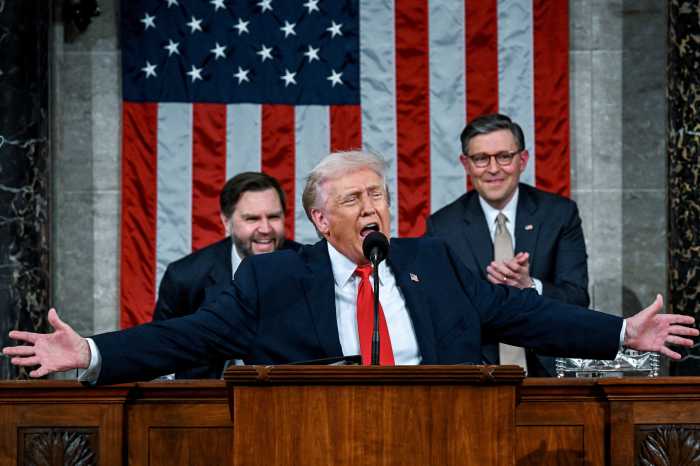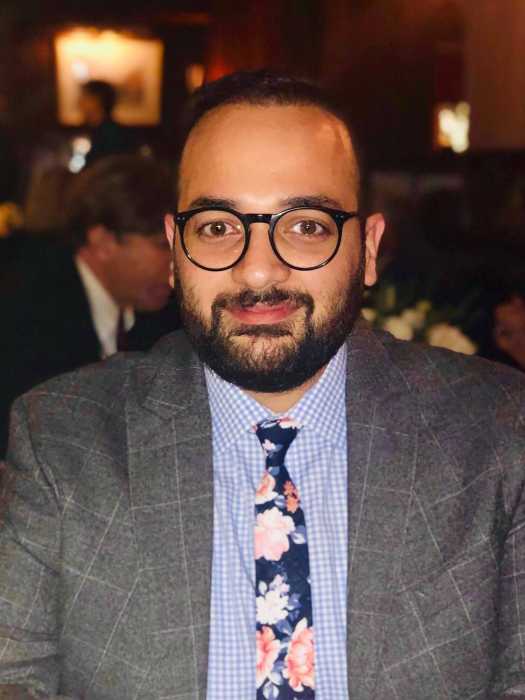On April 16, approximately 200 protesters picketed outside the headquarters of Fairchild Publications, the publisher of Details, in response to the magazine’s “Gay or Asian?” article in the April 2004 issue.
According to many Asian Americans on hand, the captions accompanying the photo of a casually dressed Asian man that included the phrasing “delicate features,” “ladyboy fingers,” and “bonsai ass,” were seen as insensitive and racist.
Asian Media Watchdog and Gay Asian Pacific Islander Men of New York (GAPIMNY) organized the protest, though a total of ten organizations co-sponsored or endorsed the event. Protesters of many races, ages, and sexual orientations participated.
Following its publication, the “Gay or Asian?” article, by Details staff writer Whitney McNally, evoked an immediate backlash of criticism. The Asian American Journalists Association (AAJA) wrote a letter to Details editor-in-chief, Daniel Peres, condemning such ethnic references like “sashimi-smooth chests” and sexual innuendos like “plucking the koto and gripping the kendo” that seemed to connote femininity in Asian men, be they straight or gay.
“While we can’t figure out exactly what the feature is trying to say––Asian men are gay? Asian men look gay? Asian men would be better off gay?––there’s no disguising the fact that it combines leering sexual innuendo and a litany of the most tired clichés about both Asian and gay culture with no goal other than to ridicule both groups,” the journalists wrote.
Peres responded that he planned to publish a brief explanatory statement in the May issue of Details.
“We appreciate the substantial feedback on this item that we have received, and we will certainly keep those concerns in mind as we move forward. We regret that anyone was offended by the article,” wrote Peres.
Several Asian activists viewed this response as equivocation, not contrition.
“They didn’t admit they did anything wrong,” said GAPIMNY co-chair John Won.
A written statement from Asian Media Watchdog went further: “Details magazine defends the feature as a piece of ‘satire’ without admitting any wrongdoing. Their defense of the feature is unacceptable.”
Support for last Friday’s protest action grew quickly, with information on letter writing and petitions circulating online and through word-of-mouth. To date, tens of thousands have signed a petition denouncing Details’ publication of the article.
Gay organizations have also spoken out. When asked about the response from gay organizations besides GAPIMNY, Asian Media Watchdog spokesperson Doris Lin said, “There’s been a great response. GLAAD also condemned the article and will be publishing a letter of their own in the May issue,” referring to the Gay and Lesbian Alliance Against Defamation, a gay media watchdog group.
Led by one of the protest’s organizers, activists soon filled the air not only with familiar rallying cries of “Recognize! Apologize!” and “What do we want? Respect! When do we want it?” but also chants tailor-made to the issue at hand, like “Details says, ‘Bonsai Ass,’ we say ‘In the Trash!’” and “Details doesn’t get me off—wax on, wax off,” intentionally playing off the characterizations that filled the April article.
Possibly in response to GAPIMNY’s letter to the editor pointing out the “either/or” declaration of the article’s title, gay protesters offered an additional chant: “Gay and Asian!”
While some picket signs singled out the writer and the magazine—“Rally Against McNally,” “Pay Attention, Forget Details”—others referred to larger issues that protesters made clear were just as urgent. “Racism is Not a Joke!” read one, while another, “Racism + Homophobia = Death,” echoed the famous ACT UP slogan, “Silence = Death.”
The chants seemed to echo protesters’ beliefs that Details published the piece knowing its potential for controversy.
“We’re outraged,” said GAPIMNY’s Won, “that Details is using racism and homophobia to sell magazines.”
Sponsors of the protest included mainstream groups as well as gay and lesbian advocacy organizations including the Asian American Legal Defense and Education Fund, the National Asian American Student Conference, the Boston Asian Student Alliance, and the Korean American League for Civic Action, as well as student groups like the Asian American Alliance at Columbia University/Barnard College and the Asian American Association of the University of Notre Dame.
The protesters demanded a more substantial apology from Details, as well as sensitivity training for editors and writers. Some protesters explained that more generally, they would like to see a more balanced media portrayal of lesbian, gay, bisexual, and transgendered Asian Americans.
Following the protest, Peres issued a written statement markedly more apologetic than the one originally planned for the May issue.
“It has been made abundantly clear to me that this story, which is part of an ongoing series challenging male cultural stereotypes, was insensitive, hurtful, and in poor taste,” he wrote. “There’s a line that should never be crossed in any satirical humor, and Details crossed it. I, on behalf of the magazine, deeply regret this misstep, and apologize to those who were offended.”
Details also contacted the organizers during the protest to agree to a meeting, which took place April 21 at the magazine’s headquarters. Present at the meeting were: Riley Snorton, GLAAD’s media manager for people of color; GAPIMNY members Jih-Fei Cheng, John Won, Alain Dang; and Pauline Park, a member of Asian and Pacific Islanders for Human Rights. Representing Details were Peres; Claudia Chung, a public relations consultant; Patrick McCarthy, an editorial director and chair of Fairchild Publications; and Andrea Kaplin, a Fairchilds communications person.
“We had a good conversation and it was actually encouraging,” Won said in a phone interview later that afternoon. The advocates told the Details executives their concerns with the lack of positive media coverage of LGBT and Asian communities and informed Peres of the experience and history of racism, homophobia, harassment, and violence experienced by LGBT Asians.
According to Won, Peres’ response was encouraging. “They expressed that it has been a learning experience for them,” Won said.
The LGBT advocates also demanded that Details take real steps to address the lack of positive coverage of Asian Americans and Pacific Islanders in the magazine. “Our focus is for positive coverage moving forward,” Won said. “They need to make right by covering gay and Asian stories and people.”
According to Snorton, the group presented to Details a letter signed by LGBT Asian organizations from across the country that included story ideas about how to represent Asians and Pacific Islanders community in a fair and accurate way.
“[Peres] was actively engaged and expressed a real interest in many of the story ideas we presented to him,” Snorton said in an e-mail.
“We are looking for tangible results to come out of that conversation in the next six to eight months,” Won said. “And we will be looking for that.”
We also publish:
Advertising




































